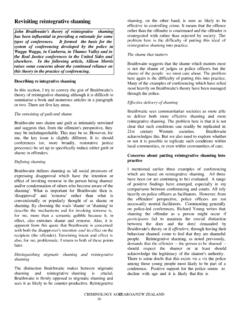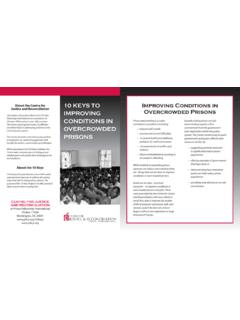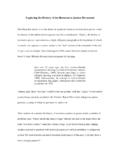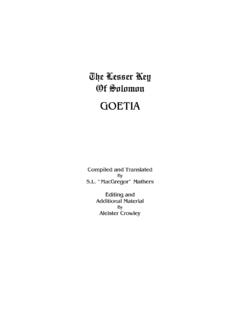Transcription of Prison, Prisoners and the Bible - Restorative Justice
1 Prison, Prisoners and the Bible A Paper Delivered to Breaking Down the Walls Conference Tukua Nga Here Kia Marama Ai Matamata, 14-16 June, 2002 Dr Christopher D. Marshall* Tyndale Graduate School of Theology, Auckland* Introduction There are few issues that evoke such powerful emotional responses in people as crime and its consequences. For many people, fear of crime is second only to fear of death. In many ways crime is a kind of death. Like death, crime can enter person s life at any time, destroy forever their sense of safety and security, and leave a legacy of anxiety and mistrust.
2 This legacy is bequeathed not only to the immediate victims of crime and their loved ones, but also to wider society. Where criminal offending is perceived to be increasing or to be largely random in its occurrence, whole communities can be traumatised by it. Even those who have never been directly victimised can feel their freedom restricted and their lives diminished by the constant worry that they may be the next to suffer. Such worry is magnified out of all proportion by selective and sensationalist coverage of crime in the mass media.
3 Even though reported crime rates in New Zealand have fallen steadily in recent years, even though our murder rate has been largely static over the last decade, even though much more violence occurs in the family home than on the streets, media concentration on a few high profile and particularly nasty crimes feeds a general perception that crime is spiralling out of all control and that one s chances of being attacked, raped or murdered are much greater today than ever In many ways, then, we live in an age of anxiety. Despite that fact that average living standards have never been higher, life expectancy has never been longer, and individual freedoms have never been more protected than they are today, a general climate of insecurity pervades much of society.
4 * Posted on by permission. * Forthcoming Justice Reflections 3/13 (2003) 1 See D. Welch, Fear and Loathing , New Zealand Listener May 11, 2002, 16-19. The NZ murder rate has hovered around 50 per year for the past 10 years, peaking at 73 in 1992 but falling to 45 in 2001. After rising inexorably for many years, even reported violent crime has fallen since 1996, except for 2001 when it rose by 5%, and then mostly because of minor rather than major assaults. 2 The flow-on effects of this pervasive culture of fear are many fold.
5 But the most obvious and disturbing effect is the burgeoning of our prison population. To our shame, New Zealand now boasts the second highest rate of imprisonment in the Western world (after USA). And by all indicators its going to get worse. One anticipated consequence of the new 2002 Sentencing Act is that more people are going to go to jail, and for longer periods, than currently. More jails will be needed and it is little short of nauseating to see politicians competing for votes by promising to build them, and to fill them, whatever it costs.
6 (Can anyone imagine a political party going on the hustings with an promise to reduce prison populations?) But, contrary to what most people think, our exploding prison population is not a symptom of increasing crime rates. There is not a one-to-one relationship between general crime rates and rates of imprisonment (although there is a closer relationship between rates of violent crime and rates of imprisonment: see graph). It is not crime rates so much as the community s general perception about crime, as reflected in social and political policy, that accounts for the prison boom.
7 The Republic of Ireland, with a population the same size as New Zealand s, has around half our prison population. This is surely not because New Zealand has twice as much crime as Ireland. Perhaps it is because we are a more punitive society, or have less imaginative judges and politicians, or more pronounced ethnically- related social and economic injustices. Yet despite our flourishing prison sector, for most people, including most Christians, prisons are out of sight, out of mind . We know prisons exist (although hopefully in someone else s backyard).
8 We re glad they exist, because they remove dangerous criminals from the streets. But what goes on in prisons, and whether they do any good, are not questions that concern us much. All we really want to know is that bad people will end up in prison, because that helps us feel safe. All the rest is someone else s problem. But this out of sight, out of mind attitude is not an option for Christians. Why? Because of what the Bible has to say about prison and Prisoners , and our responsibilities towards them, not to mention what it says about Justice , repentance, forgiveness and restoration.
9 Those who claim to take the witness of scripture seriously in shaping their beliefs and practice ought to find themselves increasingly out of step with the lock em up and throw away the key brigade which is becoming increasingly noisy in In my recent book Beyond Retribution, I set out a 1 This is not usually the case however. Christian politician Brian Neeson is a leading advocate for tougher sentences, and has recently called for the re-introduction of the death penalty. I had to put my dog down once and I found it almost impossible to do, but there are some people I wouldn t have any trouble with , West Weekly, May 22, 2002, 3thorough biblical grounding for a Christian position on Justice , crime and In this talk, I want to focus more specifically on the what Bible has to say about prison and Prisoners , and draw some lessons for a Christian response Before doing so, I want to comment briefly on how prisons have come to play such a dominant role in modern society.
10 A Brief Historical Overview We are so familiar with imprisonment as a criminal sanction that we don t often realise just how recent an innovation judicial imprisonment is. Prisons as such have existed since antiquity. As Lee Griffith observes, The power of the sword and the power of the cage have been perennial tools of human governance .3 But for most of human history, imprisonment has not been used as a way of punishing common criminals. Instead, prisons have served principally as holding tanks where offenders could be detained prior to trial or to the carrying out of the sentence of the court, such as execution, exile or enslavement, or until debts or fines had been The use of long term incarceration as method of legal punishment is a relatively modern idea, stemming only from late 18th century.




